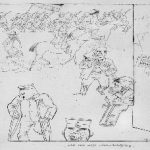79 Reviews
Marcus Roberts, Tim Hayward, Bruce Robbins, David Archard, Joseph McCarney, Chris Arthur, Kathleen Lennon, David Macey, Jason Gaiger and Stephen Morton ~ RP 079 (Sep/Oct 1996) ~ Reviews
REVIEWS Wakey wakey John Gray, Enlightenment’s Wake: Politics and Culture at the Close of the Modern Age, Routledge, London and New York, 1995. x + 203 pp., £19.99 hb., 0 415 12475 1. Why should the collapse of the Berlin Wall have come to stand as the symbol of the revolutions which swept away historical […]






